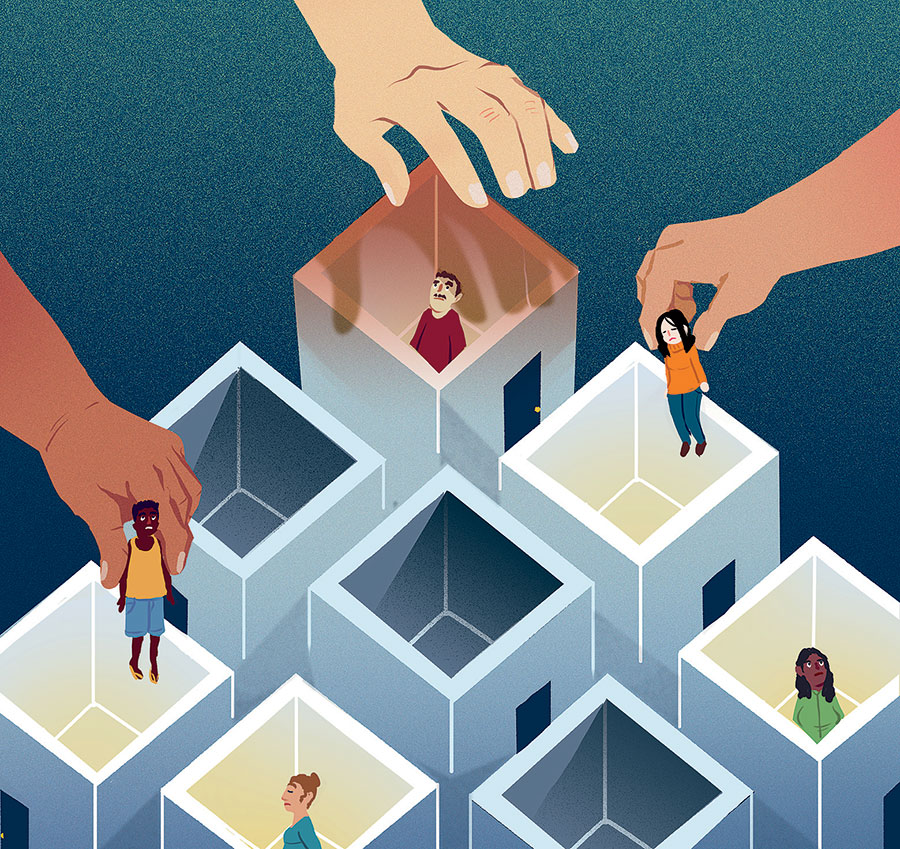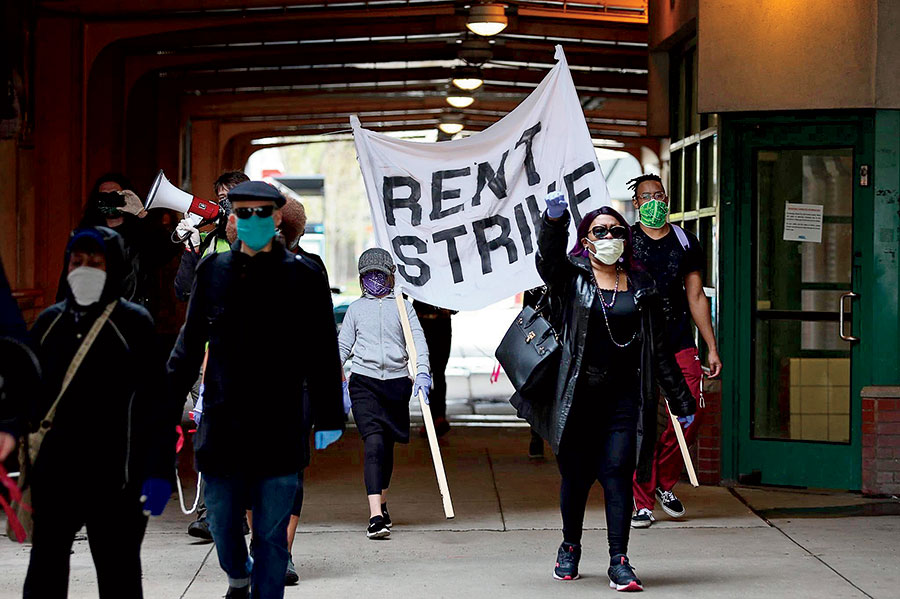
As COVID-19 descended on Chicago this spring, Roman Viere, vice president of Urban Alternatives rental properties, would lie awake trying to figure out how he could keep his business running if things really went south. The family company owns and operates about 900 rental units, mostly in Austin. “I was terrified,” Viere says. “All it would take is 10 percent of residents not to pay rent and we’d be in a tailspin.”
Many people who lost their jobs as unemployment spiked were unable to pay rent, putting housing providers like Viere in an intractable situation. But housing experts are also worried about the flip side once relief for renters ends: an impending surge of evictions. “We’re looking at a tidal wave of eviction cases,” says Philip DeVon, an attorney and tenant eviction specialist with the Metropolitan Tenants Organization in Chicago. “The emergency assistance is wholly insufficient. It’s only a drop in the bucket with half a million renters in Chicago.”
After several extensions, Governor J.B. Pritzker’s statewide eviction moratorium is scheduled to end September 19. Chicago renters won’t feel the full brunt for a while longer because of new safeguards provided by Mayor Lori Lightfoot’s eviction protection ordinance, which applies to evictions filed in the two subsequent months. Before filing evictions for nonpayment, landlords must wait seven days beyond the standard five-day notice and must first make a meaningful effort toward a resolution with tenants. That could mean discussing payment plans or third-party mediation. But even with those stopgaps, many housing experts predict a spike in expulsions this fall.
Between 2010 and 2017, Chicago saw 23,000 evictions, on average, per year. That number might jump to between 30,000 and 50,000 over the next year as courts catch up with the backlog and pandemic assistance programs run dry, DeVon says. The impact on the displaced goes beyond just losing their home. It can be nearly impossible for someone with an eviction on their record to rent a new place in the best of times, and landlords have become even pickier during the pandemic. Despite the moratorium, illegal tactics to force tenants out, such as lockouts and utility shutoffs, have shot up recently, DeVon says. He’s seen a huge increase in calls to his organization’s emergency hotline since March. “What people don’t realize is the cascading effects,” he says, “and that evicting people will cause a deeper housing crisis.”
Compounding that, the economic fallout of the pandemic could spark a foreclosure crisis for landlords similar to what happened during the mortgage crisis in 2008, says Kendra Freeman, who oversees housing policies at the Metropolitan Planning Council. “If you look at low-to-moderate-[income] homeowners who have income properties, those landlords are renting out apartments at a more affordable rate to more vulnerable renters,” she says. “Then if those landlords can’t pay their mortgages because rent isn’t coming in, it’ll be a domino effect.”

Rent collections for Viere were below average in August. Earlier in the spring, he had considered putting off maintenance and was prepared to lay off 15 people, but he hasn’t needed to implement any emergency plans, in part because of a Payment Protection Program loan. Most of his struggling tenants have been upfront, and in return Viere is helping them navigate applications for assistance. “We took on new roles of almost being like social workers,” he says. “You can’t own a property in my neighborhood and just allow it to manage itself.”
The mayor’s office is “aware of the pressure landlords and renters are facing,” according to a statement emailed to Chicago. The city offered a second round of relief starting in July for renters and property owners, totaling $33 million. The first round saw 83,000 applicants in five days, though only 2,000 people got the grants. At the state level, there’s $300 million available for property owners with mortgages. Altogether, the latest efforts are expected to cover some 55,000 households — at least 10,000 in Chicago from the city’s fund and up to 45,000 spread between the city and rest of the state from Pritzker’s pool.
It’s a good start, but is it enough? “No one thinks it is,” says Freeman, “especially with the additional unemployment benefits being interrupted.” Chicago’s housing market was already a fragile ecosystem: More than half of all tenants and the majority of low-income residents are rent-burdened, which means at least 30 percent of their income goes toward housing, according to DePaul University’s Institute for Housing Studies. Affordable housing is shrinking and incomes aren’t keeping up with rising costs — a particular concern in neighborhoods that have high renter populations, like Bronzeville.
The city is scraping together funds for emergency grants and enacting policies that help maintain stability, but those are small patches to a breakwater enduring roaring waves. “There’s an opportunity to be proactive here,” says Freeman. Preserving affordable housing now can help prevent speculative land grabs in communities at risk for high levels of evictions and foreclosures, she says. Some housing experts advocate for zoning regulations that would protect affordable housing lost to single-family home conversions and more robust tax credits to incentivize new affordable units. Also reignited is the push to lift the ban on rent control, though critics will argue any legislation that isn’t directly responsive to the pandemic isn’t worth discussing with such an uncertain future ahead.
On the other hand, “housing issues do not occur in a silo,” says DeVon. Both landlords and tenants need substantial support, and it’ll be devastating to wait until we’re on the far side of the pandemic to act further. “There should be a safety net to bear the burden,” he says. “We’re supposed to be looked out for.”




Comments are closed.